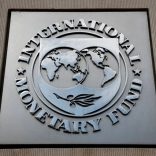Mozambique approves changes to minimize complaints about the TSU
Direct budget support dependent on dialogue with IMF

File photo
The resumption of donor support for the Mozambican state budget is conditional on “constructive dialogue” between the Mozambican government and the International Monetary Fund (IMF), according to a “confidential note” from the Management Group of the 14 countries and funding agencies that used to prove direct budget support.
That support came to an abrupt halt in April 2016, with the revelation that the true extent of loans illicitly guaranteed by the previous Mozambican government, under President Armando Guebuza, was much greater than anyone had imagined.
The government, in 2013 and 2014, guaranteed loans of over two billion US dollars from European banks (Credit Suisse and VTB of Russia) to three security-related companies, Ematum (Mozambique Tuna Company), Proindicus and MAM (Mozambique Asset Management).
Only the Ematum loan (for 850 million US dollars) was in the public domain, since it took the form of a Europan bond issue. But the loans of 622 million dollars to Proindicus and of 535 million to MAM were kept secret.
When press reports on these loans were published in April 2016, the IMF accused Mozambique of failing to disclose the true state of its foreign debt situation, and suspended its programme. Other partners followed suit, including all 14 donors to the state budget.
A key condition for resuming normal relations was an independent audit of Ematum, Proindicus and MAM, and the Attorney-General’s Office (PGR) hired Kroll Associates, reputedly the world’s foremost forensic audit company, to carry out the audit.
But, when the executive summary of the audit was published on 24 June, it showed that Kroll had not received full cooperation from the three countries. The information it contained was therefore incomplete.
The note from the GBS (General Budget Support) management group, leaked to the latest issue of the independent weekly “Savana”, pointed out that the structure of the project (supposedly for maritime security) financed by the illicit debts, the parties involved, and the potential for conflicts of interest “are possible indications or ingredients of corruption and fraud”.
The GBS Management Group noted Kroll’s finding that “no documented evidence was found of any kind of assessment (value for money, viability, etc.) of the guarantees, before signature by the Minister of Finance”.
The note added that “Person C” (not named in the report, but clearly identifiable as the then Finance Minister Manuel Chang) voluntarily admitted to breaches of the budget law, claiming that officials from the State Security and Intelligence Service (SISE) had persuaded him to sign the guarantees in the name of “national security”.
Guarantees for over two billion dollars worth of loans smashed through the ceilings on loan guarantees laid down in the 2013 and 2014 budget laws. The guarantees also violated a clause in the Mozambican constitution which states that only the country’s parliament, the Assembly of the Republic, can approve such debts.
The note also says that the Kroll report indicates “potential over-invoicing” of around 55 per cent for the assets and services provided to Ematum and Proindicus.
Unable to obtain a full explanation from the companies, Kroll compared the invoice value of goods and services with an independent valuation of such assets as the Ematum fishing boats and the Proindicus patrol vessels, uncovering a discrepancy of 713 million dollars.
There is also a mysterious 500 million dollars of the Ematum loan, apparently earmarked for military equipment, but which Kroll was unable to audit. The Mozambican defence ministry denies ever receiving such equipment, and the contractor, the Lebanese-based company Privinvest, insists that it supplied no military equipment.
Adding the 500 million to the apparent over-invoicing means that more than 1.2 billion dollars of the loans is unaccounted for.
The GBS management group noted that most of the transactions involving the loan money took place outside of Mozambique and did not go through the state financial management system (SISTAFE).
The Kroll report suggests complicity by Credit Suisse and VTB in the scandal but does not accuse them of violating international financial norms. Initially, Credit Suisse appears to have had its doubts, since, according to Kroll, it imposed a number of prior conditions that had to be met before the loans would be approved. These included approval of the operation by the Bank of Mozambique and reporting the loans to the IMF.
None of this happened, and Kroll believed that Credit Suisse had quietly dropped these requirements.
The note from the GBS Management Group called on the government to give a “credible response” that would indicate its commitment to taking the conclusions of the Kroll report seriously, bearing in mind that constructive dialogue with the IMF is a condition for resuming direct budget support.
One of the main contributors to budget support has been the World Bank. Last week, it warned that debt sustainability would be critical for the resumption of budget support.
Andrew Bvumbe, an executive director of the Bank, on a two day visit to Mozambique, told a press conference that a resumption of direct financial aid would depend on the government restructuring its foreign debt – including the Ematum, Proindicus and MAM loans.
“We will have to look at the indicators and what can be done in terms of the opportunity to restructure the debt and make it sustainable”, said Bvumbe.
However, the World Bank country director, Mark Lundell, said that freezing direct budget support does not affect the Bank’s aid for priority areas, such as education, health and agriculture.











Leave a Reply
Be the First to Comment!
You must be logged in to post a comment.
You must be logged in to post a comment.